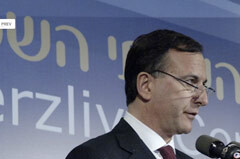The Electronic Intifada 24 January 2008

Franco Frattini addressing the conference in Herzliya. (European Commission)
At a conference in the Israeli town of Herzliya on 22 January, Franco Frattini, the vice president of the European Commission, stated that “the steps leading up to the Gaza blackout cannot be construed as a war crime,” according to a report on Ynetnews.com, a website published by the Israeli daily Yediot Aharonot. (Dana Zimmerman, “Top EU official: Gaza siege not a war crime,” Ynetnews.com, 22 January 2007.)
A published text of Frattini’s comments did not address the issue of war crimes, but blamed Hamas for the crisis. Frattini claimed that Hamas “has been provoking Israel’s armed response.” (The EU’s Take of the Israeli-Palestinian Issue, comments of Franco Frattini, published by The MediaLine, 22 January 2007.)
Since it was elected in January 2006, Hamas has made numerous offers of ceasefires which Israel has publicly rejected.
Frattini charged that “Hamas has never abandoned its plan of destroying Israel and still rejects the principle of [the] two-state solution.” Athough Hamas was democratically elected, Frattini, who is also European Commissioner for Justice, Freedom and Security, stated that “Hamas cannot be a viable interlocutor, neither for the international community, nor for the poor Palestinian people who should sooner rather than later realize that Hamas has brought them only disaster.”
Frattini, a former Italian foreign minister, who is also the top EU official responsible for combating terrorism, told his Israeli hosts that “your predicament in the face of terrorism is the same as ours.” As desperate Gazans pleaded for rescue and the UN and International Committee of the Red Cross warned that food and medicines were within days of running out, Frattini told assembled Israeli officials: “For too long, we ignored Israel’s fears and legitimate concerns about terror, fanaticism and the refusal of key groups in the Arab camp to come to terms with Israel’s existence, let alone its legitimacy.”
Frattini’s comments apparently denying the illegality of Israeli actions directly contradict those of other senior EU officials. The 27-nation union’s External Relations Commissioner Benita Ferrero-Waldner went on record that she is “against this collective punishment of the people of Gaza.” (Yossi Lempkowicz, “EU Commissioner: ‘I am against collective punishment of Gaza,’” European Jewish Press, 21 January 2008.)
The top EU foreign policy official, Javier Solana, agreed with Ferrero-Waldner. In a written statement responding to questions posed by The Electronic Intifada, Solana’s spokesperson affirmed that “as expressed by Mrs Ferrero-Waldner, Mr. Solana agrees with the use of the term ‘collective punishment’ to describe Israel’s actions.” However, Solana’s office refused to comment on the substance of Frattini’s remarks or whether they represented an official EU position.
Other international officials, incuding John Dugard, the UN special rapporteur on human rights in the Occupied Palestinian Territories, have in recent days affirmed that Israel’s actions, including the killing and wounding of dozens of civilians, and the blockade, constitute serious violations of international law.
The Fourth Geneva Convention, which governs Israel’s occupation of the West Bank and Gaza Strip, states that “To the fullest extent of the means available to it the Occupying Power has the duty of ensuring the food and medical supplies of the population; it should, in particular, bring in the necessary foodstuffs, medical stores and other articles if the resources of the occupied territory are inadequate.”
The Convention also states that no person under occupation “may be punished for an offence he or she has not personally committed” and that “Collective penalties and likewise all measures of intimidation or of terrorism” by the Occupying Power “are prohibited.”
Numerous Israeli officials, including Prime Minister Ehud Olmert and Defense Minister Ehud Barak have publicly announced their satisfaction that their orders have harmed the civilian population (See Ali Abunimah, “Where does it end?” The Electronic Intifada, 21 January 2008.)
The decision of the EU to allow an official with as high a rank as Frattini to speak in Israel in this manner in the midst of the humanitarian crisis in Gaza may be intended to send a signal of tacit EU support for Israel’s actions against Gaza despite words of criticism from other officials.
Co-founder of The Electronic Intifada, Ali Abunimah is author of One Country: A Bold Proposal to End the Israeli-Palestinian Impasse (Metropolitan Books, 2006).
Related Links


